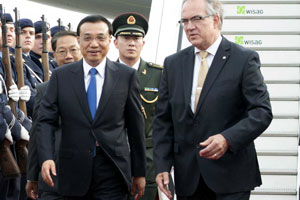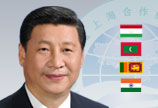US, China team up in Afghanistan
By CHEN WEIHUA in Washington (China Daily USA) Updated: 2014-10-30 11:30The US sees Afghanistan as a place of cooperation, not competition with China, a senior US State Department official said Wednesday.
"We believe China is a critical partner in this region, and has an important role to play in ensuring peace and stability in Afghanistan," said the official in a late-evening background briefing. "I want to be clear that the US sees Afghanistan as an area of real cooperation with China, and not one of competition."
The comments came before the Fourth Foreign Ministerial Conference of the Istanbul Process on Afghanistan to be held in Beijing on Oct 31.
The official quoted new Afghan President Ashraf Ghani Ahmadzai during his meeting with Chinese President Xi Jinping in Beijing two days ago that he hoped Afghanistan would be a model of cooperation for China and the United States.
"And that sentiment is noted and widely shared in Washington,"the senior State Department official said. US Secretary of State John Kerry told visiting Chinese State Councilor Yang Jiechi in Boston two weeks ago that the US sees Afghanistan as a positive part of the US-China relationship, and the two countries share an interest to see Afghanistan become an increasingly stable and prosperous country.
Chinese Foreign Minister Wang Yi and his Afghan counterpart Zarar Ahmad Osmani will co-chair the Friday meeting to be attended by foreign ministers or senior representatives from Afghanistan's neighbors and near-neighbors.
The meeting will take place amid Ghani's state visit to China from Oct 28 to 31, his first foreign visit since taking power in September.
This meeting is significant because it is the first time China will host a major international meeting on Afghanistan and also the first such meeting since the formation of the new Afghan government, Foreign Ministry spokeswoman Hua Chunying said Oct 24.
In November 2011, China, Russia, Afghanistan and several central Asian countries reached an agreement in Turkey known as the Istanbul Process, with the goal of a secure and stable Afghanistan.
The 14 members include countries such as Afghanistan, China, India, Iran, Kazakhstan, Pakistan, Russia and Turkey, while 28 supporting parties include the US, the UK, the United Nations and the Shanghai Cooperation Organization.
"It is the only regional cooperation mechanism led by regional countries on Afghanistan issues and has played a positive role in promoting Afghanistan's reconstruction," spokeswoman Hua said.
Most American and NATO combat troops will withdraw from Afghanistan by the end of this year. But some 10,000 US troops will remain there to train and advise the Afghan security forces and carry out counterterrorism missions, according to a US-Afghan security agreement signed in September.
In Washington last week, a group of young Afghan diplomats began a two-week training session as part of a joint program co-organized by China and the US.
It is the third year the two countries have partnered to train early-career Kabul diplomats, who visit the two countries in order to develop their diplomatic, communications and management skills.
While in Washington, the group, which had participated in a two-week training program in Beijing in May, will learn about US policy regarding Afghanistan, US-China relations, and the way foreign policy is created in the US.
On Tuesday, China and Afghanistan reached a consensus on combating the East Turkistan Islamic Movement as the Afghan president arrived in Beijing.
Beijing also vowed to strengthen its support for reconstruction in Afghanistan, pledging assistance of 2 billion yuan ($327 million) from 2014 to 2017. It will also train 3,000 professionals in various fields for Kabul.
"President Ghani said that the new Afghan government will firmly support China to fight the ETIM," said Kong Xuanyou, director-general of the Department of Asian Affairs at the Foreign Ministry. Kong was speaking after Ghani's meeting with President Xi.
"Afghanistan will not allow any activities that threaten China's (security) on Afghan territory," Ghani said during the meeting with Xi.
China and Afghanistan share a border of just 76 km. Support from outside of China has been behind a spate of attacks in the Xinjiang Uygur autonomous region and other locations, which have killed hundreds the past two years. Some terrorists are based on the Afghan-Pakistani border.
Contact the writer at chenweihua@chinadailyusa.com
Li Xiaokun and Xinhua News Agency contributed to the reporting.
- Withdraw from Afghanistan
- New accord on security sealed with Afghanistan
- Taliban and ISIS may take Afghanistan after US leaves
- Experts eye China's greater role in Afghanistan
- China to host international meeting on Afghanistan
- Obama invites Afghanistan's new leaders to US
- Afghanistan's new president to visit China next week










